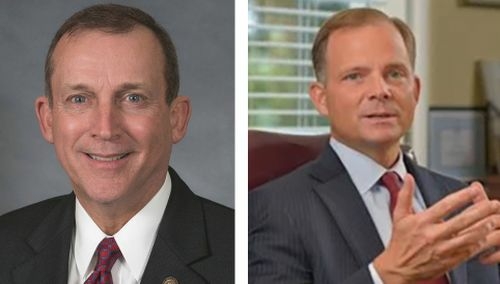New names for UNC Board of Governors are familiar political faces

The North Carolina Senate is poised to add two former Republican legislators to the UNC Board of Governors — a body long criticized as overly partisan, top-heavy with lobbyists and former GOP lawmakers and lacking in diversity.
The Senate’s Select Committee on Nominations met briefly Tuesday morning to consider six names for the board — four reappointments and two new names.
The board members to be reappointed: Joel Ford, Martin Holton, Temple Sloan and Michael Williford.
The two new nominees:
- Harry Brown, a 16-year veteran of the Senate from Onslow County and former Senate Majority Leader, and
- Haywood “Woody” White, a former senator and past chair of the New Hanover County Board of Commissioners, who also ran unsuccessfully for the GOP nomination for a U.S. House seat in 2014.
Senator Gladys Robinson (D-Guilford), a member of committee, pointed out that the two new nominees — both white Republican men — would offer little to a board she said needs to diversify if it wants to actually represent the state and the UNC System.
“This is a very diverse state,” Robinson said. “The university system is a very diverse system. And we need to have a better representation on the board of governors for those universities — women and minorities.”
Robinson, a member of the bipartisan Governor’s Commission on the Governance of Public Universities in North Carolina, said her Senate colleagues need to begin taking diversity concerns seriously.
“The majority of the UNC system are women, yet the board of governors has very few women on it,” Robinson said. “It also does not have many minorities on it as well.”
Of the board’s 24 voting members, five are women and four are Black.
“I nominated a woman last term and she didn’t get anywhere,” Robinson said. “I figured there was no need of me nominating if you’re not going to vote.”
The legislature nominates and elects members to the Board of Governors, the system’s top governance board. The current GOP majority keeps tight control over that process. Like Robinson, many Democrats have for years complained their nominees never get a vote.
But each campus in the UNC System — with the exception of the North Carolina School of Science and Mathematics — also has a board of trustees consisting of one student and 12 appointees. Eight of those appointees are appointed by the board of governors and four by the legislature.
But it wasn’t always that way.
Traditionally, the governor appointed four members of each board of trustees. But in 2016, when Republican Gov. Pat McCrory lost to Cooper, the GOP-dominated legislature moved quickly to strip the governor’s office of several powers before the Democrat could take office. Among them were those trustee appointments.
After years of criticism over the board’s racial and political makeup, Republican lawmakers added one Democrat – former State Sen. Joel Ford. Ford, who is Black, was an atypical Democrat who often butted heads with his own party during his six years in office. He ultimately lost in a primary after coming under heavy criticism for often voting with Republicans and openly suggesting he might join the GOP.
White and Brown have regularly expressed views that are very much in line with the General Assembly’s Republican majority and the conservative majority on the Board of Governors.
In 2021, White publicly resigned his position as a trustee at UNC-Wilmington, blasting the school as unfair to conservatives in a Facebook post.
“Like too many other American Universities, [UNCW] punishes conservative voices, by looking the other way, by perpetrating the double standard,” White wrote. “By knowing that thousands of students engage in self-censorship, but doing nothing about it.”
“UNCW places high value on diversity, equity and inclusion; programs, stats, and presentations on [Diversity, Equity and Inclusion] are in every meeting, touting the metrics of race and gender,” White wrote. “But not a peep about how important it is to nurture diversity of thought on college campuses.”
At the time of his resignation, White referred to the 2020 resignation and subsequent suicide of Dr. Mike Adams, a UNCW professor whose frequent racist, sexist and Islamophobic writings on conservative websites and social media led him to butt heads with university officials for decades. In a long legal battle with the university, Adams won a First Amendment retaliation suit with the school in 2014 that cost UNCW $700,000 — $615,000 of which went to Adams’ attorney fees.
In July of 2020, shortly before he shot and killed himself, Adams had reached a $500,000 agreement with the university to retire early. That agreement came after an increasingly bizarre series of Twitter posts wherein he compared mask mandates to living as a Black person under slavery, employed a mock slave dialect, declared that the nation was already in the midst of a civil war and encouraged people to buy assault rifles and said “it is time to talk about overthrowing the government.”
Controversy over the comments led to public pressure to fire Adams, a sentiment with which many students and faculty and some on the board of trustees agreed.
In some conservative circles, Adams has become a martyr figure whose admirers claim he was hounded into suicide for his political beliefs.
“When a conservative professor fights for equality in his 1st Amendment rights and wins $700,000, he remains an outcast by an unrepentant Administration and bullied to a point where he kills himself,” white wrote. “But When a liberal professor advocates violence against conservative students, nobody says anything. Nothing happens.”
White was alluding to a 2021 incident in which UNCW Associate Professor Dan Johnson wrote “Blow up Republicans” on his personal Facebook page. Johnson did not reference students in the post, which he deleted and for which he apologized after it was made public.








